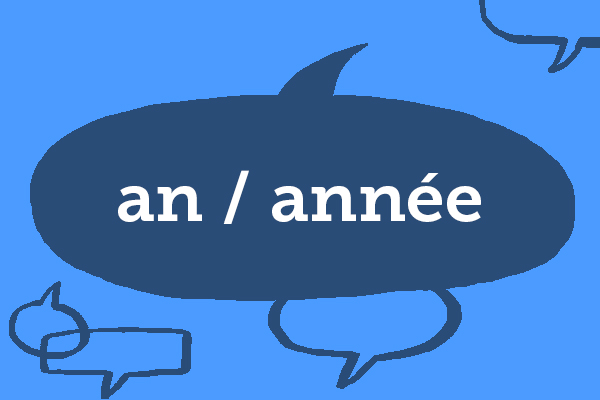For this week’s edition of our word of the week blog, we’re looking at the word an, and its related word année.
Before we start learning about what these words mean, listen to the pronunciations in the audio clips below:
Both an and année mean year in English. We’ve paired them together in one blog because they share the same translation. However, despite having the same meaning, each word is used in different situations. The general distinction between the two words can be understood as follows:
- An is used as a unit of time when counting years, or to refer to a certain point in time (where years are the unit of time).
- Année is used when talking about a specific year, or length/duration of years over time, as well as for ordinal numbers.
In terms of grammar, both of these words are French nouns. It is worth noting that each of these nouns is a different gender:
- un/l’an year (masculine)
- une/l’année year (feminine)
You can also add an -s to the end of either word to make the noun into a plural.
In order to better understand the differences between the two usages, let’s study some examples.
Firstly, we’ll look at the word an:
« Quel âge as-tu ? » « J’ai trente ans » “How old are you?” “I’m thirty years old.”
Ma mère a vécu dix ans en Espagne. My mother lived in Spain for ten years.
Nous ferons une fête pour le nouvel an. We’ll have a party for New Year.
Il faut faire ce sondage quatre fois par an. It’s necessary to do this survey four times a year.
bon an mal an on the whole; on average; in general
Let’s also look at année in action:
Karim et ses amis adorent la musique des années 60. Karim and his friends love 60s music.
La troisième année de la guerre était la plus difficile. The third year of the war was the most difficult one.
Cette année, je vais voyager en Asie. This year, I’m going to travel to Asia.
Bonne année ! Happy New Year!
tout au long de l’année all year long; throughout the whole year
l’année scolaire the school year
depuis plusieurs années for several years
Some of the set phrases in the examples above can help you decide when to use either word in different contexts. In some cases, the two words can be interchangeable. But remember about adjectival agreement if using either word with an accompanying adjective:
- l’an dernier/prochain last/next year
- l’année dernière/prochaine last/next year
That’s all for this week. But we’ll be posting blogs just like this all year round! We hope to see you here again for the next one.
Written by Holly Tarbet, freelance copywriter and editor.
All opinions expressed on this blog are those of the individual writers, and do not necessarily reflect the opinions or policies of Collins, or its parent company, HarperCollins.



